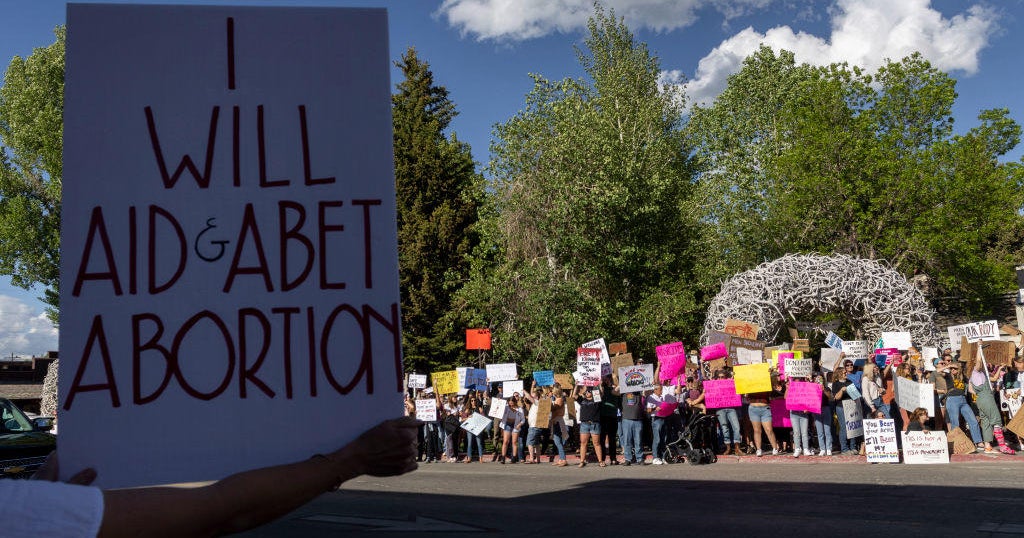South Carolina lawmakers propose criminalizing abortion
South Carolina lawmakers have introduced legislation that seeks to criminalize abortion and make women and their doctors subject to felony charges if they receive or perform the procedure. Their efforts mark the latest state-level push to restrict access to abortion as politicians across the country prepare for a potential overturn of Roe v. Wade by the U.S. Supreme Court.
State Senator Richard Cash and state Representative Josiah Magnuson separately introduced "personhood" legislation to South Carolina's legislature this session. The House bill specifically seeks to "establish that the right to life for each born and preborn human being vests at fertilization." By defining the beginning of life at fertilization, the proposals would effectively prohibit abortion, granting that the unborn can't be "deprived of life without due process of law nor denied the equal protection of the laws." The Senate bill matches that language.
Magnuson's law makes exceptions for when the mother's life is at risk, and specifically clarifies that the bill would not impact access to birth control methods. Cash's legislation has similar exceptions, but it also proposes that having or performing an abortion be deemed a felony, referring to abortion as "the shedding of innocent blood."
However, the bills would not take effect -- even if they become state law -- unless the Supreme Court moves to overturn its 1973 Roe v. Wade decision, which prohibited states from banning abortion prior to fetus viability. The landmark ruling secured a woman's right to access the procedure across the U.S., regardless of state.
Cash, in a telephone interview with CBS News, said that the purpose of his bill was twofold. First, if passed, the legislation could be used to challenge the high court's ruling on abortion access, potentially prompting an overturn of the original decision. Second, if Roe v. Wade is overturned, South Carolina would already have anti-abortion laws in its books, making the procedure immediately illegal, Cash said.
"We're always hopeful in moving the needle and challenging the way people think about the killing of unborn children," said Cash, who has spent his entire professional career fighting against abortion. "There's a need and urgency to do something at the state level and not just wait for someone else."
Elizabeth Nash, a senior states-issue manager at Guttmacher, called it "very concerning."
"This bill could have some momentum given the political climate," she told CBS News.
Cash's bill was introduced and referred to committee Wednesday, according to the state legislator's website. Magnuson's was introduced and referred to committee in January.
South Carolina lawmakers, including Cash, have introduced several "personhood" measures in the statehouse in previous sessions, but all have failed to pass.
Magnuson did not immediately respond to calls and voicemails requesting comment.
With a Republican White House and increasingly conservative Supreme Court, some believe that the days of Roe v. Wade may be numbered. During a 2016 presidential debate, then-candidate Donald Trump said he foresaw the ruling being overturned if he were elected because he planned to appoint pro-life judges. He stressed the issue again in a speech before the 2018 midterm elections.
The Supreme Court has not agreed to hear a direct challenge to Roe. But if it eventually does, and if a majority of the justices vote to overturn that precedent, it would be up to individual states to determine whether to restrict or outlaw abortion within its borders.
The proposals in South Carolina are similar to laws passed in other states. Voters in Alabama approved a state ballot measure in November that amended the state constitution to include that its policy was to protect "the sanctity of unborn life and the rights of unborn children, including the right to life." The legislation also clarified that the state's official stance on abortion was to "ensure the protection of the rights of the unborn child in all manners and measures lawful and appropriate."
In the event that justices overturn Roe v. Wade, the law would immediately take effect and outlaw pregnancy-ending procedures. Two other states -- Kansas and Missouri -- have similar "personhood" laws in place that would go into effect if Roe is overturned.
In blue-leaning states, politicians have gone the other direction, successfully passing laws that dramatically expand a woman's access to abortion. In New York, lawmakers passed the "Reproductive Health Act" last month which allows for abortions after 24 week if the fetus is not viable or if there is a risk to the mother's health.
Last week, Virginia's embattled Governor Ralph Northam expressed his approval of a sweeping Virginia abortion bill that would expand abortion access in the state by eliminating a 24-hour waiting period. It would also allow the procedure to take place in non-hospital settings if it is performed during the second trimester, and widen availability to third-trimester abortions in the event that the mother's health is at risk.
During his State of the Union address on Tuesday night, President Trump took aim at the hot-button issue, vowing to end late-term abortions while asking Congress to "work together to build a culture that cherishes innocent life."




